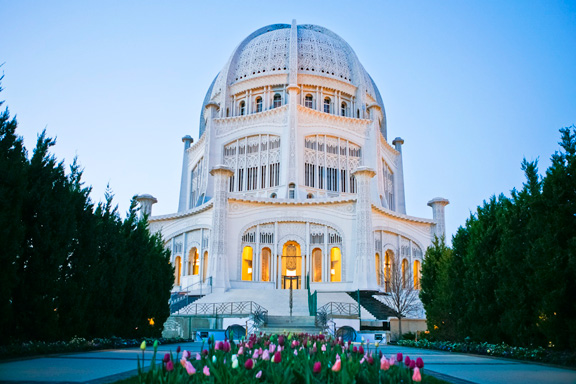The views expressed in our content reflect individual perspectives and do not represent the authoritative views of the Baha'i Faith.
Unscrupulous politicians often use a tactic called “guilt by association.” For example, some folks made much of the idea that then-Senator Obama—to quote one source—“palled around with” terrorists.
When I think of terrorists, I think of people who make a (very short) career out of blowing things up (including themselves) and who seem to care very little who goes with them—innocent people on an airplane or in an office building, or children in a daycare center, it matters not. When I think of being someone’s “pal,” I think of my own friends—in filk music fandom or the Baha’i community—with whom I socialize, travel, sing, study, worship. In other words, people I’m close to.
These are exactly the images that the rhetoric is intended to evoke. It juxtaposes the warm, comfort of friendship against the horror of people like the Twin Towers or Murrow Building bombers. The guilt by association tactic asks: How could any human being with a conscience be “pals” with such people?
In the actual facts of this situation, the terrorist in question was—at the point the senator encountered him—a respected academician, not the wild-eyed, dogmatic, desperate madman evoked by the term “terrorist.” Regardless of the propriety or impropriety of the association, or how one feels about the people involved, the rhetoric effectively put an end to any rational thought about it for a vast number of people. It’s like a massive game of telephone, in which everything else is drowned out by static, except the words “palled around” and “terrorist.” The loaded emotional content of the words themselves drown out everything else, including reason and logic.
Another example comes to us via the controversy over the so-called “Ground Zero Mosque.” National Public Radio correspondent Ron Elving wrote an article on it for the NPR website that began this way: “GROUND ZERO MOSQUE. The phrase sums up a controversy in terms so vivid and concise that neither journalists nor water cooler pundits can resist using them…” “Of course,” Elving continues, “the phrase is also inaccurate and misleading. But how much does that constrain us when a phrase is so catchy and touches such a resonant emotional chord? …Of course, the actual facts of the case were somewhat complicated. But the need to explain the case was obliterated by the emergence of the perfect phrase: Ground Zero Mosque.”
The phrase was inaccurate because the building was not at Ground Zero, was to be a neighborhood cultural center used by everyone, irrespective of religion, and would have had a day care center and an events space. Elving is right—those three words touch a resonant emotional chord. Unfortunately, they do something more than that: they shut down rational thought.
“Say those three words,” he says, ”and no further facts or explanation are necessary. It instantly conjures the image of a massive Islamic shrine, bristling with minarets, rising from the ashes of the World Trade Center site itself. One can practically hear the voices crying ”Allah’u’akhbar!” and see thousands of Muslim faithful, kneeling in ranks, bowing to Mecca, hating America, conspiring against us. Right over the ashes of the martyrs of 9/11. …So conceived,” concludes Elving, “the whole idea is monstrous. And not true.” (Ron Elving’s entire article is here.)

Baha’i House of Worship in Wilmette
Elving uses the word “conjuring” in the metaphorical sense of words conjuring an image. Christian apologist JK van Baalen uses that word, too, with different effect. After speaking of the “outlandishly named” Baha’i temple in Wilmette, Illinois, Reverend van Baalen says of the Baha’is—“And with this temple they conjure.”
In six words—which mean nothing in context—the writer misleadingly and incorrectly links the Baha’i Faith with the occult. The sentence is content-free, but some unquestioning readers will remember that Baha’is, like witches, must use their temple to conjure… something. The word may not even register consciously but—as Ron Elving notes—it doesn’t need to.
A friend of mine often wrote articles critical of the Baha’i Faith in the local newspaper where we used to live. In one, he mentioned the Baha’is in the same breath with al-Qaida, noting the armed conflict and brutal suppression of the Babis and Baha’is that took place in the early days of the Faith. He went on to tell of how Baha’u’llah “quickly began modernizing the various cells.” (The Baha’i Faith has no “cells.”) He concluded: “If the world responds to al-Qaida with condemnation and military force, perhaps they too will adopt a quietist expression of their religion, as the Baha’is have. Let’s hope they do.” (emphasis mine)
This is clever: he makes a direct, but unsupported link between Baha’is and al-Qaida through the use of the word “cells,” then implies that the Baha’is have become “quietist” because of “condemnation and military force.” Ironically, my friend is a student of Christian history, and knows that some early enemies of his own faith used similar devices when speaking of the young Christian community, accusing them of infanticide, sexual deviance and disloyalty to government. But most striking to me was that he knew what he implied was untrue, and that the peaceful, “quietist” Baha’i teachings predated the suppression. I wondered if he considered how his words might affect real relationships between Baha’is and their neighbors in our small town.
Every word is endowed with a spirit, therefore the speaker or expounder should carefully deliver his words at the appropriate time and place, for the impression which each word maketh is clearly evident and perceptible. …One word is like unto springtime causing the tender saplings of the rose-garden of knowledge to become verdant and flourishing, while another word is even as a deadly poison. – Baha’u’llah, Tablets of Baha’u’llah, p. 172.
Next: Sleight of Tongue.
You May Also Like
Comments

















How about writing regarding how the attitudes develop of political supporters on both sides that support their own 100% without question and accuse the opponent of being the lowest form of life on the planet?
A "respected academician" respected by whom? Would we be as forgiving if Bill Ayers was a former KKK member that Obama deigned to meet to further his political career? Personally, I would shun this respected professor and his wife. Obama's willingness to pander to them just proves to me the vileness of our political system. http://www.diyzine.com/weatherundergroundarticle3.html
It's clear that you have strong dislike for Dr. Ayers and perhaps for Mr. Obama as well. Bahá'u'lláh asks that we approach our investigation of reality ...without either love or hate, lest that love incline us to error or that hate impel us away from the truth. The truth, in this case, is that Mr. Obama met Dr. Ayers at a point in his life when he had eschewed his former radicalism and had paid his debt to society for his violent youth. According to my reading of scripture, forgiveness is demanded of us.
Yes, our political system is vile. It causes people to view each other as "us" and "them". It reduces forgiveness to pandering and the Golden Rule to "political correctness". Bahá'ís are asked to rise above that divisiveness, to return hate with love, to forgive and to remember Bahá'u'lláh's warning that someone who has lived a wretched life can find salvation in his last hour, while the steadfast believer can lose his. We have no way of knowing, ultimately, what is in another's heart. We have only their behavior in the here and now to go by.